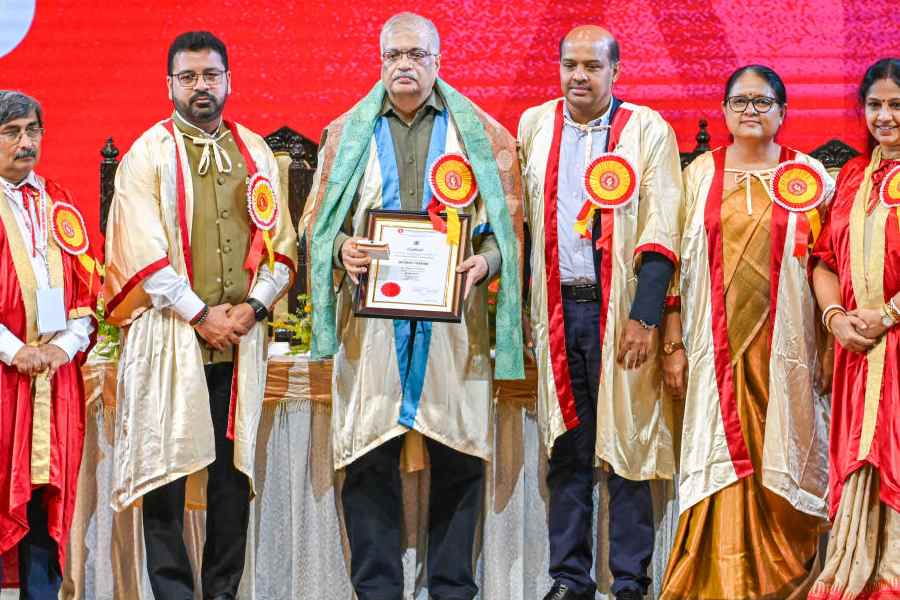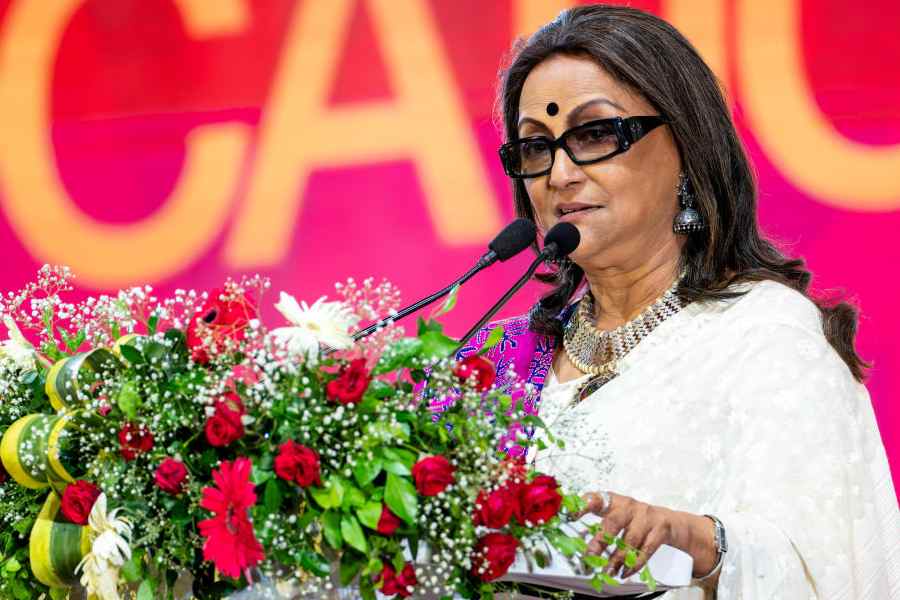Students of Techno India University receiving their university-leaving degrees also received a lesson in being responsible citizens on their convocation day. “It is not enough to pay taxes and cast your vote. Our duty is to be vigilant of the government we choose,” they were told.
The advice came from filmmaker and actor Aparna Sen, who was herself receiving a honorary D.Litt in film literature at the ceremony. She was candid in pointing out that “apart from writing a few screenplays, I haven’t really worked on any kind of literature to receive a D.Litt in film literature per se.”
But it was her candour about the need to be politically aware that struck a chord. “This year, we celebrated 78 years of India’s independence from the British. We have come far as a democracy. In 1947, a lot of people said Indian democracy wouldn’t last long. But we survived... We must criticise the government where it is necessary, otherwise we will get the leaders we deserve. We have to hold them accountable for what they do with public money,” she told the audience of graduating students in her own acceptance speech.

D.Litt awardee Sumantra Chattarji (centre) flanked by Sanjay Jain of Google Education India (left) and Jagadisha Bhat of IBM
Also receiving honorary D.Litt degrees along with her at the programme held on August 20 at Biswa Bangla Convention Centre were British restaurateur and activist Asma Khan, singers Subha Mudgal and Hariharan, magician P.C. Sorcar Jr, social entrepreneur Arunachalam Muruganatham, mental health activist Dr Sumantra Chattarji and neurologist Hrishikesh Kumar. Of two other awardees, chemical engineer Raghunath Anant Mashelkar joined online while designer Rajeev Sethi did not attend.
If Sen spoke of the duty of the voter, Hariharan sang a ditty infused with communal harmony, evoking both Krishna and Allah. “Music is the only language I speak, my message to the youth lies in my lyrics. We are all children of the same god. I hope we always remember this,” said the man who accepted the honorary D.Litt for his contribution to Indian music and cultural integration.
At the convocation ceremony, about 1,400 students were handed their respective degrees on completion of undergraduate, post-graduate and doctorate courses along with gold medals and certificates. The programme began with a homage to Salil Chowdhury, whose centenary year this is. Students from Techno India School and Techno India University performed Chowdhury’s compositions like Biswapita tumi hey prabhu, Duronto ghurni, Surer ei jharna and Dhitaang dhitaang boley. This was followed by the inaugural lighting of the lamp by dignitaries on stage.
“Today marks the beginning of a chapter for the graduating students. The knowledge gained here will open many doors but it is character, integrity, resilience and empathy that will truly guide them. In a world that is constantly evolving, the ability to adapt and innovate will define their path. Leading with purpose, embracing challenges as opportunities, and remembering that success is not measured by titles but by the difference made, will be the key,” said Goutam Roychowdhury, chancellor of Techno India University and the founder-chairman of the Techno India Group, in course of his speech.
“Our distinguished D.Litt. awardees stand as living embodiments of what can be achieved through unwavering passion and a commitment to excellence. Their journeys are powerful ideologies in themselves—stories that will continue to influence and inspire our students. As the Class of 2025 steps into the next chapter of their lives, let them remember that success is not solely defined by the destination, but by the positive impact they create along the way,” said Manoshi Roychowdhury, co-chancellor of Techno India University and co-chairperson of Techno India Group. She had a special word for the chief guest, Prof. Sanghamitra Bandyopadhyay, director of the Indian Statistical Institute, whom she described as an “icon in educational leadership”.
Prof. Bandyopadhyay, who gave away many of the awards, pointed out that youngsters needed to set the bar high and strive for excellence at a time when India was looking to become an influential global power. She also said that some of the top universities in the world were private universities and one should not be biased towards government universities.
Dr. Arunachalam Muruganantham, popularly known as Pad Man and on whose life a Hindi film has been made, encouraged students not to lose hope. Citing his own life as example, he said that people in his village considered him a pervert when he first started working on menstrual hygiene. However, when global recognition came to his door, the same people changed their opinion of him overnight and wished to work with him. “Even though the first half of one’s life could be tedious, things do take a turn for the better,” he said.
Agreed Asma Khan, owner of the all-female restaurant Darjeeling Express in London: “I have worked on various food and famine programmes with Unesco and the most important thing that I have learnt is power comes from whose life you can change. Success is not bank balance. Be kind and that makes you the most powerful person in the world.”
Several industry dignitaries such as Jagadisha Bhat, market leader, IBM Expert Labs, ISA, and Sanjay Jain, head of Google Education, India, were present.










